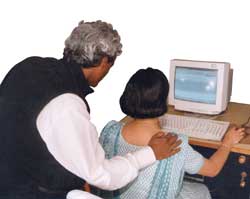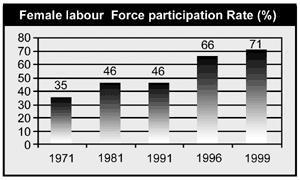 Ranju is at the end of her tether. An executive secretary in a government project, Ranju has begun finding her workplace unbearable, as she has to deal with overtures from the manager everyday. "I can't take it anymore," she says. The veiled verbal propositions, sly fondling, invitations to work late and to accompany the boss on excursions, are all getting to her.
Ranju is at the end of her tether. An executive secretary in a government project, Ranju has begun finding her workplace unbearable, as she has to deal with overtures from the manager everyday. "I can't take it anymore," she says. The veiled verbal propositions, sly fondling, invitations to work late and to accompany the boss on excursions, are all getting to her. Ranju, a mother of two in her early 30s, doesn't know who to complain to. Even if she does, she fears she'll lose her job. "He's in charge, what can I do?" she asks. Her refusal to comply with the boss has resulted in her banishment to a tiny corner of the office, a delay in promotions, and badmouthing in the office. The only person Ranju (name changed) has confided in is a close friend. "I can't even tell my husband, there'd be a scene, and I can't face the public humiliation," she says, frustrated. "I've been looking for another job, but good jobs are hard to get. And I need to help support my family."
Ranju's is a classic case of sexual harassment, an increasingly common, if seldom voiced experience as more women join the workforce. Last year, the ILO commissioned the Forum for Women Law and Development to conduct a survey on Sexual Harassment in the Workplace in Nepal among trade unions, employers/ managers, employees/ workers and policymakers and civil society. The figures in the unpublished report are telling:
- Over 48 percent of the 66 female employees/workers surveyed had experienced sexual harassment in the workplace.
- Close to 40 percent of female employees and 14 percent of the 14 male workers surveyed said they were aware of sexual harassment taking place.
- 80 percent of policy makers and civil society, close to three-quarters of employers and management, and 38.5 percent of trade unionists acknowledged that sexual harassment is common where there is a significant mass of workers, such as among carpet, garment, and factory workers.
- 90 percent of policymakers and civil society, and 63 percent of employers and managers said sexual harassment is common at the helper level, with sweepers, cleaners, domestic workers etc being commonly
victimised.
In addition, the study says, women working in private firms, government, in the domestic work sphere and in hotels and restaurants are also prone to sexual harassment. And that isn't all either. Another survey on Gender and Judges conducted by Pro Public found that 53.85 percent of 26 women lawyers in eight districts surveyed said they felt that judges addressed them differently from male colleagues. Seventy-three percent said they felt physical or verbal harassment as women advocates, 69 percent said they have been subjected to remarks and jokes in court, in firms, and in chambers which were personally demeaning to them and to women in general.Nepal's lack of specific laws dealing with sexual harassment has made it tough for lawyers and victims to fight cases. Says Anita Chapagain of Legal Aid and Counselling Centre (LACC), "First, we get very few cases of that nature as victims fear public humiliation and feel nothing will be done about it anyway. Second, since there is no specific law, we have to deal with such cases as public crime offence, verbal abuse or attempted rape-the latter being extremely difficult to prove."
 It is interesting to note, however, after a decade of the trade union movement in Nepal, which began in 1990, there has been a considerable decline in rape cases, and a marginal decline in other harassment-unwelcome verbal contact, physical contact, and advances and verbal conduct of a sexual nature, says a report on a decade of the trade union movement in Nepal. "Stronger unions and a growing awareness that it's not just a gender but a position-related issue, encourages workers to report cases of sexual harassment," says trade unionist Binda Pandey. Pandey, who heads the education wing of the General Federation of Nepalese Trade Unions (GEFONT), says that since 1996 the Federation has been emphasising sexual harassment as an issue. "Initially this was considered a social problem, not the work of the trade union to address," says Pandey.
It is interesting to note, however, after a decade of the trade union movement in Nepal, which began in 1990, there has been a considerable decline in rape cases, and a marginal decline in other harassment-unwelcome verbal contact, physical contact, and advances and verbal conduct of a sexual nature, says a report on a decade of the trade union movement in Nepal. "Stronger unions and a growing awareness that it's not just a gender but a position-related issue, encourages workers to report cases of sexual harassment," says trade unionist Binda Pandey. Pandey, who heads the education wing of the General Federation of Nepalese Trade Unions (GEFONT), says that since 1996 the Federation has been emphasising sexual harassment as an issue. "Initially this was considered a social problem, not the work of the trade union to address," says Pandey. That is changing. This year, for the first time, the Federation has a chapter on sexual harassment in its course book for trade union workers. Chapter six of the book defines sexual harassment as an act of ill sexual intention committed by a man or a woman. The chapter cites rape, unwanted embraces, path-blocking, stalking, pinching, prolonged hand-fondling, verbal harassment (jokes, insinuations, suggestive comments about a person's appearance), non-verbal harassment (winking, tongue-clicking, pornographic pictures) as kinds of sexual harassment. The book explains how sexual harassment can give rise to anger and fear, and have a psychological impact on victims, causing a loss of self-esteem and low spirits. Physical effects of harassment are evident in loss of sleep, weight, pressure, headaches, and ulcers.
"Lack of legal remedies and fear of public humiliation discourage people to talk about sexual harassment," says Bina Shrestha, head of GEFONT's women's wing. "We encourage our workers to bring the issue into the open and address the problem. Our women educators ensure that workers don't overlook the chapter on harassment," says Shrestha. She recently managed to coax a group of city cleaners to confront a man who was harassing them in secluded places while on the job.
The Federation has also recommended that the Labour Act should define all acts of sexual abuse and sexual harassment as misconduct (immoral act) and stipulate appropriate punishment. The recommendations include provisions for expulsion of the offender from the job and, in some cases, imprisonment. They also say that, provisions should be made such that the management should pay indemnity to the victim and that the amount should be recovered from the offender.
"It's important that the management be held accountable for allowing sexual harassment take place in the workplace in the first place," says Pandey. When Business Age magazine contacted 50 prominent companies to check their preparedness to handle the issue, it elicited only six responses. According to the magazine, Hyatt Regency and Nepal Lever are two companies that have included a clause about sexual harassment in their employment policies.
Nepal's country code does deal with some specific sexual offences like rape, incest and intention to sexual intercourse, but it is not adequate to protect victims of harassment. Chapter 1 of the Country Code, which deals with "intention to sexual intercourse", prohibits touching any organ from head to foot of a woman above the age of 11, except one's own wife with the intention to have sexual intercourse and prescribes a punishment with a fine up to Rs 500 or imprisonment of up to one year."
There are several flaws in the legal provision," says advocate Sapana Pradhan Malla who conducted the study for the ILO. First, says Malla, in the survey, it is difficult to distinguish this offence from the offence of attempt to rape. Second, this legal provision doesn't apply to victims below 11, which means that a large number of minors in the formal and informal service sectors are left unprotected. Third, the provision carries minimal punishment. As a result, prosecution for rape or attempt to rape is manipulated and convictions are only made under this provision.
The recently passed Domestic Violence Bill, defines domestic violnce as either physical or mental, and includes sexual harassment under physical violence. The Bill stipulates a maximum fine of Rs 30,000, or four months imprisonment, or both as the penalty for doemstic violence.


